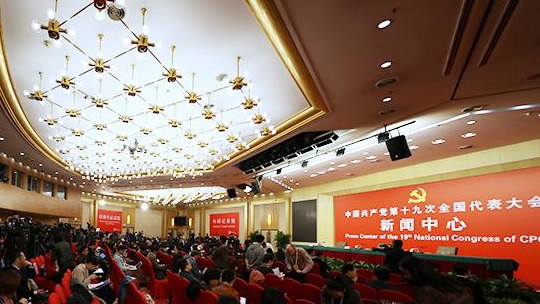
Politics
15:35, 19-Oct-2017
Five takeaways from CPC discipline Q&A
By John Goodrich

China’s anti-corruption drive will continue at full force over the next five years, officials said at the first press conference of the 19th National Congress of the Communist Party of China (CPC) on Thursday morning.
Here are five highlights from the question and answer session following the initial briefing on Party-building and discipline by Yang Xiaodu, deputy secretary of the CPC Central Commission for Discipline Inspection (CCDI), and Qi Yu, deputy head of the Organization Department of the CPC Central Committee.

Yang Xiaodu, deputy secretary of the Central Commission for Discipline Inspection (CCDI), briefs media in Beijing, October 19, 2017. /Xinhua Photo
Yang Xiaodu, deputy secretary of the Central Commission for Discipline Inspection (CCDI), briefs media in Beijing, October 19, 2017. /Xinhua Photo
Future of anti-corruption drive
The central message of the press conference was clear: the anti-corruption drive continues.
Yang said much has been achieved in tackling hedonism and extravagance since 2012, and bureaucracy and formalism would be in focus over the coming five years.
Enforcing discipline remains a long-term task for the entire Party, he said, adding that the a “tough stance to fight against corruption” would continue. A “sweeping” victory would be achieved, Yang said, when officials “dare not be corrupt and do not want to be corrupt.”
He added that the key to ending misconduct was the resolve of the leadership.
The CCDI will over the next five years focus inspections on Party officials who have refused to refrain from misconduct, those with complaints from the public, and officials in important positions with potential for promotion.

Xinhua Photo
Xinhua Photo
Discipline agency strength
Yang stressed the importance of strong agencies to deliver results. “To strike iron the blacksmith must be strong,” he said, and pledged to retain only “loyal, honest and accountable inspection teams.”
He also said that he expected amendments to the Party Constitution, to be discussed later this week, to give strong support to the anti-corruption drive. He noted that the Constitution gives the CCDI the power to act, and guide those actions.
Loopholes closed
In response to a question as to how Sun Zhengcai had risen to be Party Secretary of Chongqing, Yang acknowledged that there had sometimes been weak and lax Party governance in the past. Sun was expelled from the CPC and dismissed from public office for "serious discipline violations."
The CCDI deputy secretary said that while there had been loopholes in the system in the past, the work since the 18th CPC National Congress had striven to close any gaps. He added that the CPC “never shies away from its problems” and no one acting with duplicity will thrive.

Leading officials from the Central Commission for Discipline Inspection (CCDI) of the Communist Party of China (CPC) and the Party's Organization Department brief media on strengthening party-building and comprehensively practicing strict Party self-governance in Beijing, October 19, 2017. /Photo via China.com
Leading officials from the Central Commission for Discipline Inspection (CCDI) of the Communist Party of China (CPC) and the Party's Organization Department brief media on strengthening party-building and comprehensively practicing strict Party self-governance in Beijing, October 19, 2017. /Photo via China.com
How many delegates?
Qi addressed questions over the number of delegates at the 19th CPC National Congress.
Initially 2,300 delegates were elected to attend the event, he stated, but 27 were found to be ineligible following additional checks on their political stance and ethical integrity. Fourteen replacements were then elected by the local Party in Chongqing, making 2,287. Subsequently seven were disqualified after further checks.
Party in business
Qi stressed that the presence of Party cells within state-owned, private and foreign-invested companies was “consistent practice in line with the law," and added that this was a favorable development for the businesses.
It is an “important force in continuing the development of enterprises,” he said, and was welcomed and supported by the vast majority of companies.
7km

SITEMAP
Copyright © 2018 CGTN. Beijing ICP prepared NO.16065310-3
Copyright © 2018 CGTN. Beijing ICP prepared NO.16065310-3